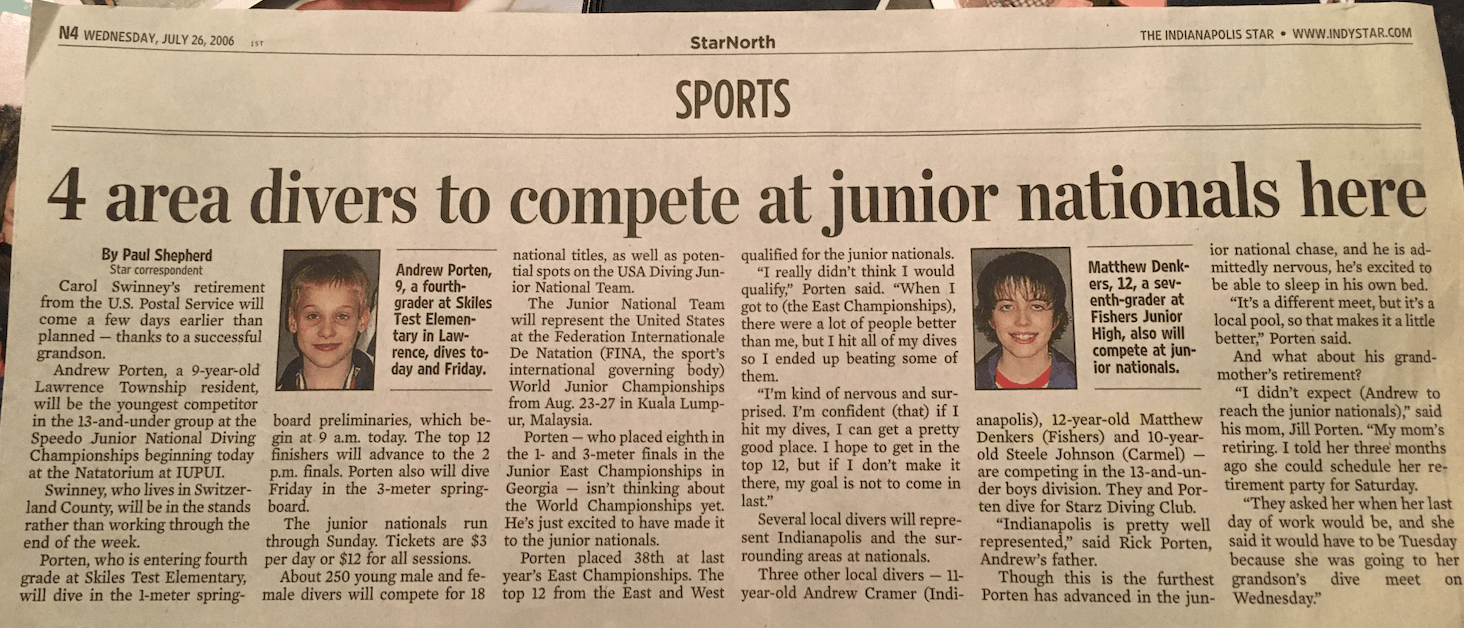Life lessons from diving 😤
Published 1/21/24

TL;DR: make yourself do things you don't want to do (with maximum effort)
My diving career
I tried different sports growing up (tee-ball, basketball, soccer, even cheerleading), but none of them really clicked. Then in 5th grade, all of us students got sent home with flyers about the local springboard diving team. My dad saw the flyer in my backpack, and since I liked jumping on the trampoline so much, convinced me to give it a shot. While I didn’t know it at the time, that was the beginning of my ~15 year journey in the sport!

Here’s a rough timeline:
- 2003: started diving
- 2006: placed 7th at nationals on 1m
- 2010: took a break because I was burned out
- 2011: joined BYU team
- 2012-2014: lived abroad, no diving
- 2015-2018: continued competing for BYU
- 2018-2019: assistant coach for BYU team after finishing eligibility
While diving definitely had its ups and downs (pun intended), I love it as a sport and it holds a special place in my heart. I think without diving in my life, a lot of my core personality traits these days would be pretty different.
The biggest lesson I learned
Anyone who dedicates a significant amount of time to any sport (or hobby, or craft) will learn a ton along the way. I owe a lot to diving, as it taught me a lot about myself and what I’m capable of. It also taught me how to manage my emotions, exercise, stretch, lift weights with proper form, push myself, compete, crave criticism and improvement, be confident, be resilient after failure, and so much more.
With the benefit of a few years removed from the sport, as I reflect on it now, I think one particular lesson stands out the most. Diving, probably more than most other sports, forces you to continuously do things you don’t want to do 💀. And not only that, you have to do those things well, with maximum effort.
I have some (not so) fond memories of being 21, staying out late on a Friday night with friends, and then having to go to a 7am platform practice. The water’s freezing, I’m exhausted, but I have to be there. And I have to do platform, which I hate. And I have to learn a new hard platform dive. Fun, right? Even though I’m being dramatic and painting a bleak picture, I’m really glad I had to do that every weekend for years, because it taught me self-control.
So what’s the lesson? I think it can be summarized in 2 parts:
1. Do things you don't want to do2. Do those things well, with maximum effort
I think a lot of people understand the idea of self-control/discipline and are pretty good at point #1. However, let’s be honest - it’s really easy to half-ass something you don’t want to do. In diving, you learn pretty quickly that it’s a terrible idea to half-ass anything. If a diver gets up on the 3m springboard or the 10m platform and gives anything less than 100% effort, they’re pretty much guaranteed to walk away with some gnarly bruises.
Applying that lesson elsewhere
Now that I’m a dover (get it?), I’m focused on trying to find success in other areas of my life. I think internalizing the concept of doing things I don’t want to do (with maximum effort) has helped me stand out and progress in some of these other areas, especially my career.
I think for the most part, people thrive when they’re doing work they’re excited and passionate about. High quality outcomes follow naturally, because the work itself is rewarding and engaging. But what about when the work is boring, monotonous, invisible, or simply not fun? In my opinion, anyone who can figure out how to absolutely nail that type of work will succeed in whatever they decide to do.
In diving, each dive is scored by the judges on a 0-10 scale. What if our bosses or peers consistently scored our work with the same scale? Striving for perfect 10s on both the “fun work” and the “shitty work” is probably the most important general life advice I could offer to someone.
Conclusion
As I read some of this back, it feels weird that I’m trying to offer life advice. I’ll be the first to admit I’m not the most successful person in the world by many metrics. I think it’s important to distinguish inputs vs outputs in this case. We don’t always have 100% control over outputs in life, but we do have 100% control over many inputs, especially effort. I hope everyone’s main takeaway from this post is to try. We all have to do things we don’t want to do - how much effort and care are you willing to invest into those things?
P.S. you’re welcome for not including more Speedo pics, I found plenty 😅